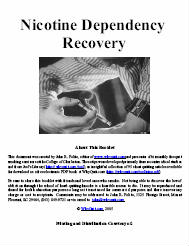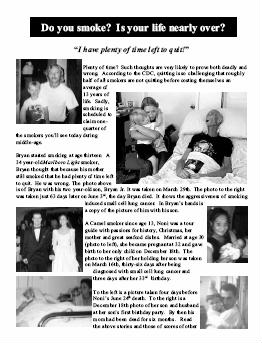
Physicians Turning to Free Patient Quit Smoking Resources
September 16, 2005 John R. Polito
Imagine the tremendous physician frustration at watching 95% of patient attempts to quit smoking end in relapse within a year. Imagine twenty years of nicotine replacement therapy marketing telling your patients that NRT doubles their chances of quitting when your own empirical evidence tells you that it simply isn't true. It can feel like trying to swim upstream. Sadly, it gradually becomes easier for doctors not to ask patients about smoking than to deal with the answer.
 Increasingly physicians are turning to WhyQuit.com, the Internet's oldest free forum dedicated to abrupt nicotine cessation. Years of careful listening have taught them that "cold turkey" is the quitting method responsible for producing almost all long-term successful quitters. At WhyQuit they find a growing array of free quitting booklets that can be downloaded, printed and shared with patients.
Increasingly physicians are turning to WhyQuit.com, the Internet's oldest free forum dedicated to abrupt nicotine cessation. Years of careful listening have taught them that "cold turkey" is the quitting method responsible for producing almost all long-term successful quitters. At WhyQuit they find a growing array of free quitting booklets that can be downloaded, printed and shared with patients.
The newest addition to the collection is an eight page patient handout called "Nicotine Dependency Recovery." The Recovery booklet opens by attacking two core smoker rationalizations: (1) that the patient has plenty of time left to quit, and (2) that the patient is not a "real" drug addict but has simply developed a "nasty little habit."
 Page two contains graphic images of young smokers in their early 30s dying as they battle small cell lung cancer. Page three shatters the "nasty little habit" myth with a photo of the Canadian addiction warning label. The warning covers half of the front-face of random Canadian cigarette packs and reads, "Warning - Cigarettes are highly addictive - Studies have shown that tobacco can be harder to quit than heroin or cocaine."
Page two contains graphic images of young smokers in their early 30s dying as they battle small cell lung cancer. Page three shatters the "nasty little habit" myth with a photo of the Canadian addiction warning label. The warning covers half of the front-face of random Canadian cigarette packs and reads, "Warning - Cigarettes are highly addictive - Studies have shown that tobacco can be harder to quit than heroin or cocaine."
The final five pages of the Recovery booklet contain a wide array of 48 quitting tips, the likes of which few physicians or smokers have ever seen. Contrary to official government quitting advice, WhyQuit does not encourage quitters "not be hard on themselves about slipping" or to "prepare to relapse." Instead it guarantees that any quitter who adheres to obeying the "law of addiction," in remaining 100% nicotine free, is guaranteed success during their next attempt.
Again, contrary to government advice, the booklet encourages quitters to confront, re-condition and extinguish subconscious smoking triggers instead of attempting to avoid or hide from them. It teaches that meeting, greeting and defeating each and every subconscious smoking cue, residing inside a mind suffering from serious yet normal cessation time distortion, is a mandatory part of healing and recovery.
Tips range from how to avoid unnecessary anxieties and symptoms associated with needless blood sugar swings and a rather amazing nicotine/caffeine interaction, to overcoming the natural emotional loss associated with ending a long and extremely dependable chemical relationship. Readers are taught the importance of preserving motivations and of quitting for themselves not others.
Patients receive lessons in avoiding quitting crutches while being provided effective crave coping techniques. They are given a basic recovery road map of the timing and sequencing of physiological changes, subconscious cue reconditioning, and expectations regarding overcoming years and mountains of conscious thoughts, memories and rationalizations about smoking.
The title page encourages physicians to add their name and logo to the bottom in taking credit for printing and distributing the booklet, but forbids any charge or cost to patients for receiving any of WhyQuit's free materials. The new booklet can be downloaded at whyquit.com/books where it is available in PDF and Word formats.
At the above link physicians will also find a free 149 page quitting book entitled "Never Take Another Puff." Written by Joel Spitzer of Chicago, very possibly the Babe Ruth/Henry Aaron of cessation clinic programs, it contains 95 short quitting articles on almost every cessation topic imaginable. Spitzer's electronic book and recent medical studies form the foundation for the tips contained in WhyQuit's new Recovery handout.

